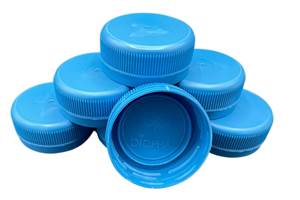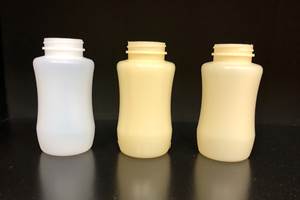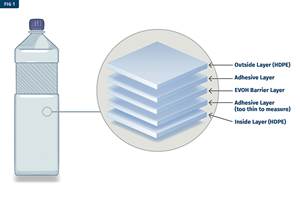Walmart Commits to New Plastic Packaging Waste Reduction Initiatives
The company is working with suppliers to expand efforts to improve the sustainability of its private brand product packaging, with an emphasis on increasing recyclability and making it easier for customers to recycle.
Walmart issued a new set of plastic waste reduction commitments that is focused on its massive private brand program. The new commitments, announced at Walmart’s annual supplier forum, are expected to impact over 30,000 SKUs. The move is focused on the retailer’s private brand packaging, building upon existing efforts to reduce plastic waste in Walmart U.S. and Sam’s Club operations, and encouraging national brand suppliers to set similar packaging goals. At the supplier forum, Walmart executives highlighted that the company is working with suppliers to expand efforts to improve the sustainability of its private brand product packaging, with an emphasis on increasing recyclability and making it easier for customers to recycle.
Walmart announced that it will work with its U.S. private brand suppliers on the following commitments:
- Seek to achieve 100 percent recyclable, reusable or industrially compostable packaging for its private brand packaging by 2025;
- Target at least 20 percent post-consumer recycled content in private brand packaging by 2025;
- Label 100 percent of food and consumable private brand packaging with the How2Recycle label by 2022;
- Work with suppliers to eliminate the non-recyclable packaging material PVC in general merchandise packaging by 2020; and
- Reduce private brand plastic packaging when possible, optimizing the use to meet the need.
Walmart also encouraged it’s national brand suppliers to make similar packaging commitments through the retailer’s Project Gigaton platform. The retailer has also introduced a new recycling playbook designed to provide information to companies pursuing recyclable packaging and recycled content goals. The recycling playbook gives overviews on what type of plastic packaging is more easily recyclable and provides information on recycling challenges for certain packaging materials. This new recycling guidance is a supplement to Walmart’s existing sustainable packaging playbook that offers information on sustainable packaging best practices such as optimizing packaging design and using consumer-friendly recycling labels.
Some of the retailer’s current efforts to reach this goal include:
- Offering low cost, high quality alternatives for single use plastic consumable products such as straws, cutlery and disposable tabletops;
- Recycling shrink wrap in most markets—151 million pounds of plastics were recycled globally in 2017;
- Providing access to in-store plastic bag and film recycling bins for customers; and
- Encouraging suppliers to include the How2Recycle label on pack—last year more than 800 Walmart private label suppliers participated.
“As a global retailer that has set an ambitious aspirational goal to create zero waste, we fully recognize that reducing plastic waste by increasing packaging circularity is an area where Walmart can lead,” said Laura Phillips, senior vice president for global sustainability at Walmart. “Today’s announcement marks another key milestone in our ongoing journey of working with our private brand and national brand suppliers to deliver access to high-quality, sustainable products as part of the Walmart everyday low price promise.”
In being a signatory to the G7 Oceans Plastics Charter and the New Plastics Economy Global Commitment being led by the Ellen MacArthur Foundation, in collaboration with the UN Environment, Walmart is working globally to reduce plastic waste within its operations and throughout its value chain. By the end of 2017, Walmart diverted from landfills 81 percent of unsold products, packaging and other waste materials in the U.S.
Related Content
PHA Compound Molded into “World’s First” Biodegradable Bottle Closures
Beyond Plastic and partners have created a certified biodegradable PHA compound that can be injection molded into 38-mm closures in a sub 6-second cycle from a multicavity hot runner tool.
Read MoreHow to Extrusion Blow Mold PHA/PLA Blends
You need to pay attention to the inherent characteristics of biopolymers PHA/PLA materials when setting process parameters to realize better and more consistent outcomes.
Read MoreMeasuring Multilayer Plastic Containers Made Easier With Today's Ultrasonic Gauges
Ultrasonic gauge technology has evolved to simplify measurement of very thin layers in plastic containers. Today’s gauges with high-frequency capabilities and specialized software can make multilayer container measurement quick and easy for ordinary users.
Read MoreThe Recycling Collaboration That Is Making Circular Film a Reality
Nova Chemicals and Novolex are commissioning a large mechanical recycling facility for film to film.
Read MoreRead Next
People 4.0 – How to Get Buy-In from Your Staff for Industry 4.0 Systems
Implementing a production monitoring system as the foundation of a ‘smart factory’ is about integrating people with new technology as much as it is about integrating machines and computers. Here are tips from a company that has gone through the process.
Read MoreBeyond Prototypes: 8 Ways the Plastics Industry Is Using 3D Printing
Plastics processors are finding applications for 3D printing around the plant and across the supply chain. Here are 8 examples to look for at NPE2024.
Read MoreLead the Conversation, Change the Conversation
Coverage of single-use plastics can be both misleading and demoralizing. Here are 10 tips for changing the perception of the plastics industry at your company and in your community.
Read More














